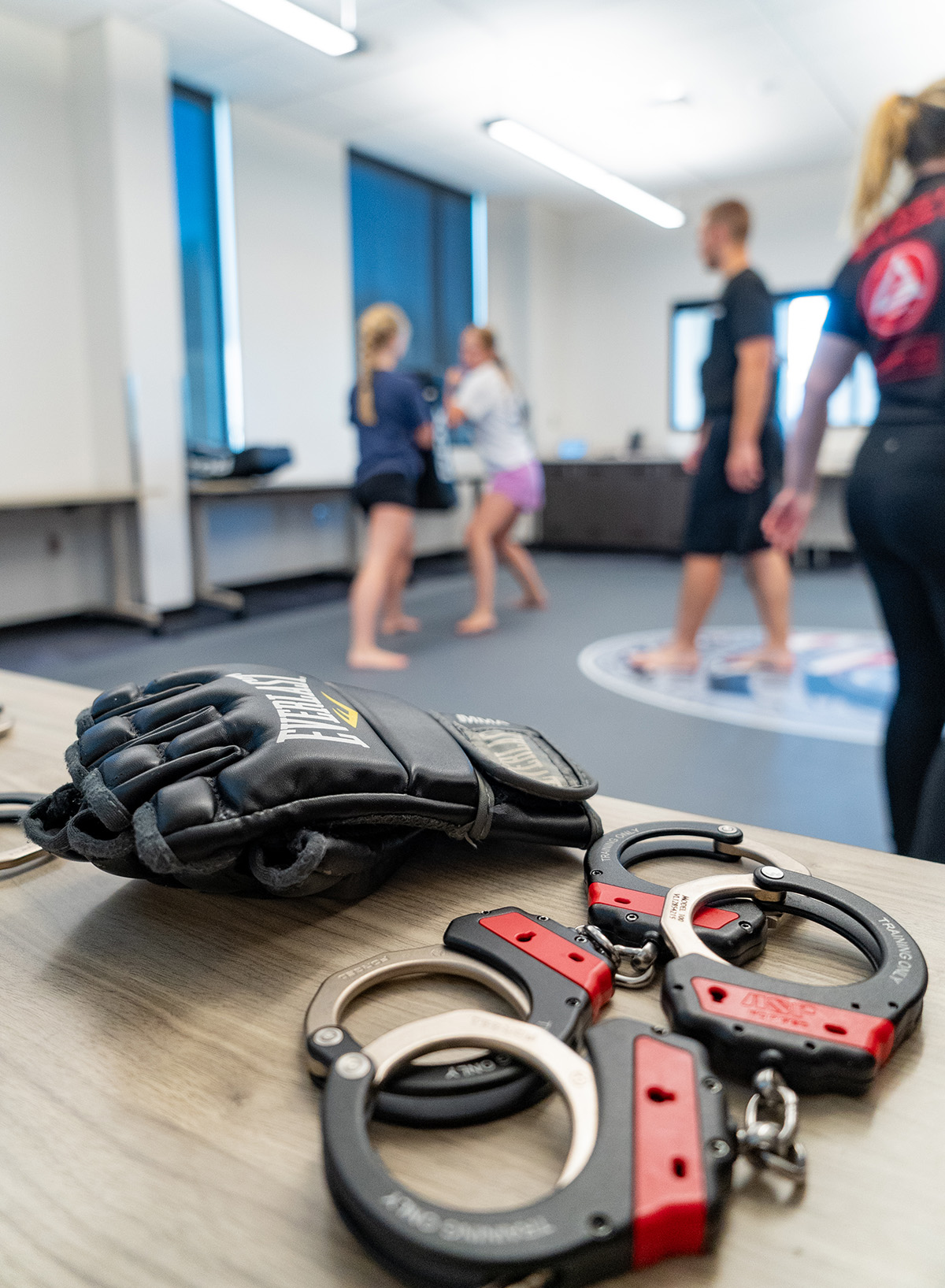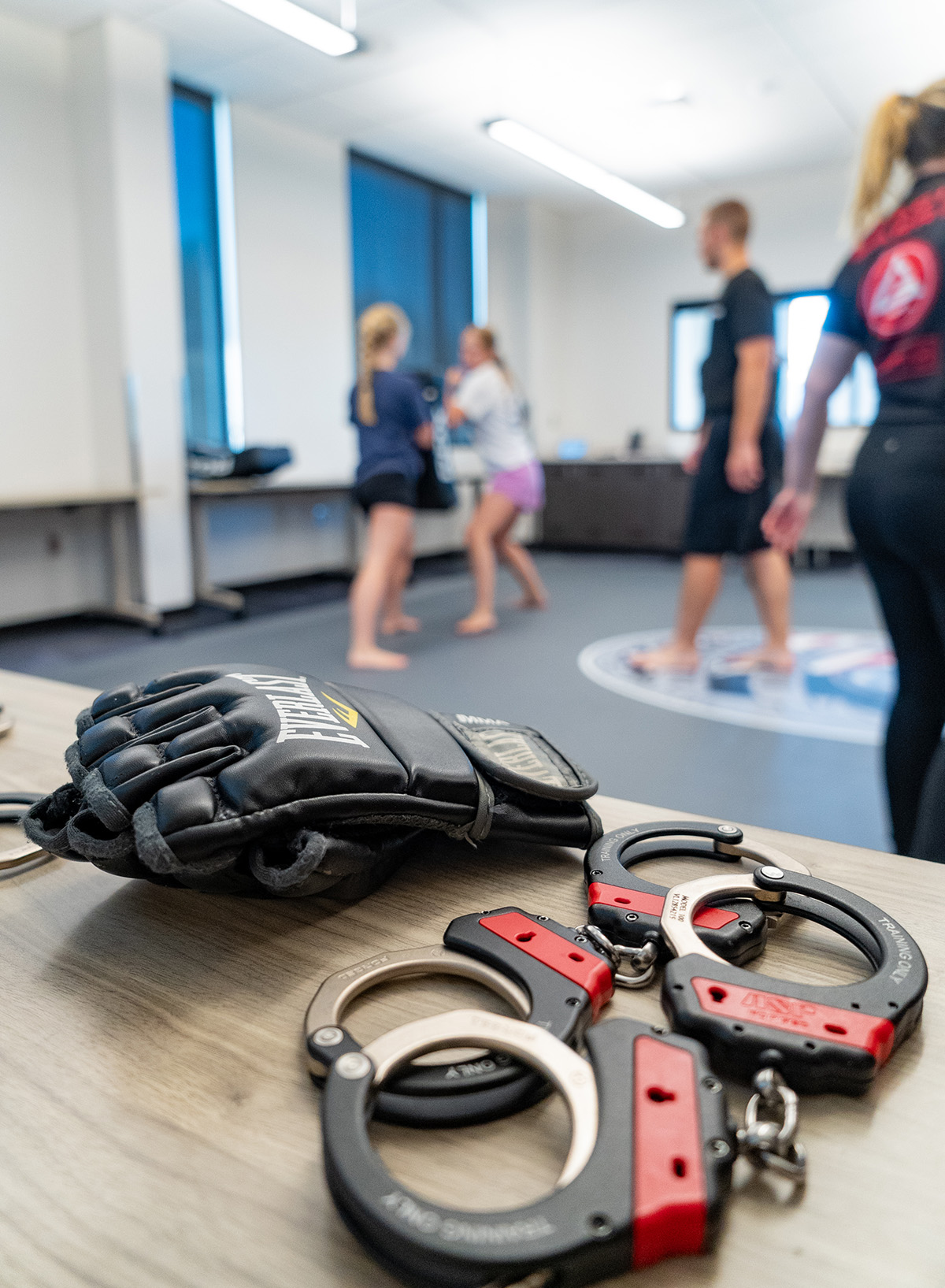U of I police mini academy trains students in real-world skills for law enforcement careers
Students leverage criminology training to kickstart careers with local, state and federal police
Cheyenne Stooks is a rookie on the Moscow police force.
The former U of I criminology student is also a grappler and is experienced in emergency medical procedures, the use of firearms, high speed car chases and the arduous practice of calming crime victims and ensuring their safety.
Much of what Stooks knows as a patrol officer was first introduced to her as a student on the Moscow campus where she enrolled in a one-week police mini academy and graduated to become a police cadet.
Each fall, the mini academy, operated by the Moscow Police Department and U of I’s criminology program, is an initiation for a handful of students who want to see what it’s like to be a cop. It is also the preamble for student police cadets on the Moscow force to learn the basics of police work.
“It's an immersive experience, just like the law enforcement process,” said Stooks who was hired by the department in Fall 2024. “So, the whole principle of the program is to show students what it's like to get in law enforcement and then what the career is like.”

U of I police mini academy trains future officers
Each fall, a combined University of Idaho and Moscow Police Department mini police academy, operated by the MPD and U of I’s criminology program, is an initiation for a handful of students who want to see what it’s like to be a cop.
At the mini academy and later as a student cadet, Stooks learned how to conduct traffic stops and the rules that govern the use of force by police officers. She acquired skills to help mitigate potentially dangerous situations. She learned de-escalation techniques such as speaking calmly, maintaining non-threatening body language to reduce tension and gain voluntary compliance without resorting to force.
The cadet program is designed to give students a chance to experience law enforcement training in a realistic and grounded way. Joseph De Angelis, criminology professor
In the event that force was necessary, Stooks was instructed in a form of martial arts that includes grappling and is used by police to subdue combative suspects during an arrest. She learned basic emergency medical techniques, legal processes and how to interview for police jobs.
“The weeklong mini academy includes every topic taught in the Idaho Police Officer Standards and Training Academy which every new officer must attend to become a police officer in Idaho,” said Jacob Tesdahl, a corporal on the Moscow force and the cadet program administrator. “We brush over many topics during the mini academy because we don’t have time to go more in-depth, but it's a full minimum 40-hour academy.”
The idea for enrolling willing University of Idaho criminology students in a cadet program emerged in 2022 out of discussions between the Moscow Police Department and the University of Idaho’s criminology program about how to expand law enforcement-related internship opportunities for students.
Joseph De Angelis
Associate Professor
“The cadet program is designed to give students a chance to experience law enforcement training in a realistic and grounded way,” Joseph De Angelis, an associate professor in the U of I’s criminology program noted. “It gets them out of the classroom. It gives the Moscow Police Department time to interact with them, and it gives our students a direct education in what it means to work in law enforcement.”
Students receive training that will help them be successful when they enter the market for law enforcement jobs after they graduate. Students learn how to safely perform traffic stops, how to put handcuffs on, how to detain, control and if necessary, how to grapple with someone. Cadets learn to shoot handguns and basic lifesaving skills.
“The Moscow Police Department’s trainers have a tremendous amount of expertise and experience, and the program allows students to undergo pretty rigorous training,” De Angelis said. “The cadets leave this program with practical knowledge and skills that are not available to most undergraduate students.”
Officer Jacob Tesdahl, who leads the program for the police department said the cadet mini-academy and the year-long cadet program has successfully turned students into prospective police officer applicants as they apply to local departments as well as for state and federal law enforcement jobs.
“The whole principle of the program is to show students what it’s like to get into law enforcement and what the career is like,” Tesdahl said.

Article by Ralph Bartholdt, University Communications
Photos by Garrett Britton, University Visual Productions
Video by Garrett Britton and Joseph De Angelis
Published in May 2025









